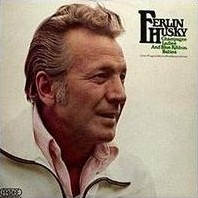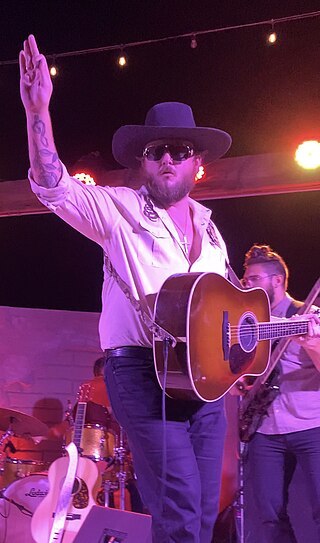Related Research Articles

"Rock Around the Clock" is a rock and roll song in the 12-bar blues format written by Max C. Freedman and James E. Myers in 1952. The best-known and most successful rendition was recorded by Bill Haley & His Comets in 1954 for American Decca. It was a number one single for two months and did well on the United Kingdom charts; the recording also reentered the UK Singles Chart in the 1960s and 1970s.

Walter Louis Garland, known professionally as Hank Garland, was an American guitarist and songwriter. He started as a country musician, played rock and roll as it became popular in the 1950s, and released a jazz album in 1960. His career was cut short when a car accident in 1961 left him unable to perform.

KFXR is a commercial AM radio station in Dallas, Texas, and serving the Dallas–Fort Worth metroplex. It is owned by iHeartMedia and airs a conservative talk radio format. Its studios and offices are located along Dallas Parkway in Farmers Branch.
"Have I Told You Lately That I Love You?" is a popular song written by Scotty Wiseman for the 1944 musical film, Sing, Neighbor, Sing and performed by Lulu Belle and Scotty. It was their greatest hit and one of the first country music songs to attract major attention in the pop music field. Although the song was featured in the movie, it was not released by Lulu Belle and Scotty until 1947. The first released version of this song was by Gene Autry in 1945.

"Train Kept A-Rollin'" is a song first recorded by American jazz and rhythm and blues musician Tiny Bradshaw in 1951. Originally performed in the style of a jump blues, Bradshaw borrowed lyrics from an earlier song and set them to an upbeat shuffle arrangement that inspired other musicians to perform and record it. Johnny Burnette and the Rock and Roll Trio made an important contribution in 1956 – they reworked it as a guitar riff-driven song, which features an early use of intentionally distorted guitar in rock music.
The following is a list of players, both past and current, who appeared at least in one game for the Cincinnati Reds National League franchise, also known previously as the Cincinnati Red Stockings (1882–1889) and Cincinnati Redlegs (1953–1958). Players in Bold are members of the National Baseball Hall of Fame.

Burn Your Playhouse Down – The Unreleased Duets is the 60th and final studio album by American country music singer George Jones released on August 19, 2008 on the Bandit Records label. It features duets never before released, including some that were cut from his 1994 duets album The Bradley Barn Sessions. The only new recording in the collection is "You And Me And Time", a song Jones recorded with his daughter by Tammy Wynette, Georgette. A music video accompanied the song. The album features several duets with artist from outside the country music pantheon, including Mark Knopfler, Leon Russell, and Keith Richards. The album peaked at number 15 on the Billboard country albums chart. Of the album's title track, Andrew Meuller of Uncut opined in July 2013, "The segue from Richards trying to sing like Jones to Jones actually singing like Jones is hilarious."

Blow-Up is a soundtrack album by American jazz pianist Herbie Hancock, featuring music composed for Michelangelo Antonioni's 1966 film Blowup. MGM Records released the album in the United States on 20 February 1967, and in the United Kingdom on 10 May. The album features performances by Hancock, trumpeters Freddie Hubbard and Joe Newman, alto saxophonist Phil Woods, tenor saxophonist Joe Henderson, guitarist Jim Hall, bassist Ron Carter and drummer Jack DeJohnette. Although Jimmy Smith is credited with playing organ on the album, some sources claim it was actually Paul Griffin who was at the sessions.
"There'll Be Some Changes Made" ("Changes") is a popular song by Benton Overstreet (composer) and Billy Higgins (lyricist). Published in 1921, the song has flourished in several genres, particularly jazz. The song has endured for as many years as a jazz standard. According to the online The Jazz Discography, "Changes" had been recorded 404 times as of May 2018. The song and its record debut were revolutionary, in that the songwriters (Overstreet and Higgins, the original copyright publisher, Harry Herbert Pace, the vocalist to first record it, the owners of Black Swan, the opera singer for whom the label was named, and the musicians on the recording led by Fletcher Henderson, were all African American. The production is identified by historians as a notable part of the Harlem Renaissance.

By the end of the 1940s, the nervous energy and tension of bebop was replaced with a tendency towards calm and smoothness, with the sounds of cool jazz, which favoured long, linear melodic lines. It emerged in New York City, as a result of the mixture of the styles of predominantly white swing jazz musicians and predominantly black bebop musicians, and it dominated jazz in the first half of the 1950s. The starting point were a series of singles on Capitol Records in 1949 and 1950 of a nonet led by trumpeter Miles Davis, collected and released first on a ten-inch and later a twelve-inch as the Birth of the Cool. Cool jazz recordings by Chet Baker, Dave Brubeck, Bill Evans, Gil Evans, Stan Getz and the Modern Jazz Quartet usually have a "lighter" sound which avoided the aggressive tempos and harmonic abstraction of bebop. Cool jazz later became strongly identified with the West Coast jazz scene, but also had a particular resonance in Europe, especially Scandinavia, with emergence of such major figures as baritone saxophonist Lars Gullin and pianist Bengt Hallberg. The theoretical underpinnings of cool jazz were set out by the blind Chicago pianist Lennie Tristano, and its influence stretches into such later developments as Bossa nova, modal jazz, and even free jazz. See also the list of cool jazz and West Coast musicians for further detail.

More Gunfighter Ballads and Trail Songs is a studio album by country music singer Marty Robbins. It was released in 1960 by Columbia Records as a sequel to Robbins's 1959 hit album Gunfighter Ballads and Trail Songs.
James Albert Beck was an American country music talent agent, record promoter, recording studio owner, A&R engineer, record producer, and music publisher from Dallas, Texas, best known for discovering and being the first to record Lefty Frizzell.

Champagne Ladies and Blue Ribbon Babies is an album by American country music singer Ferlin Husky, released in 1974 by ABC Records. The album reached #43 in the US Country Charts. The title track single "Champagne Ladies and Blue Ribbon Babies" reached #34 in the US Country Charts and the single of "Burning" reached #37. These were his last chart-making singles. "Wings of a Dove," a gospel song, was a No. 1 country hit in 1960 and was one of his signature songs.

Donald Firth Law was an English-American record producer and music business executive. He produced Robert Johnson's only recordings, and as head of Columbia Records' country music division later worked with many leading country musicians including Bob Wills, Carl Smith, Flatt and Scruggs, Lefty Frizzell, Ray Price, Johnny Horton, Marty Robbins and Johnny Cash.
"I Couldn't Keep from Crying" is a song written and recorded by American country music artist Marty Robbins. Performers on the song include Slim Harbert on bass, Johnny Gimble on fiddle, Jimmy Rollins and Joe Knight on guitar, and Harold Carmack on piano.

Herbert Paul Gilley was an American country music lyricist and promoter from Kentucky. In his lifetime, he was little known as a songwriter, but decades after his death by drowning at age 27, he was identified more widely as likely having written the lyrics to a dozen famous songs, including two that were hits for Hank Williams: "Cold, Cold Heart" and "I'm So Lonesome I Could Cry". He may have also written "I Overlooked an Orchid", which was a number-one country hit in 1974 for Mickey Gilley. Other songs that have been attributed to Gilley include "If Teardrops Were Pennies", "Don't Let the Stars Get in Your Eyes", and "Crazy Arms".

Buddy is a free monthly music magazine serving the North Texas and Northeast Texas regions. It was first published in Austin, Texas, in October 1972 as a free bi-monthly. Stoney Burns (pseudonym of Brent Lasalle Stein; 1942–2011) and Rob Edleson (né Lewis Robin Edleson; born 1946) were the founders. The magazine's name is a tribute to Buddy Holly (1936–1959), who Burns said "changed my life." Buddy is described as a rock music magazine but, from its beginning, has included news and feature articles about performing artists and events of other genres, namely Texas progressive country, blues, jazz, folk, punk, and garage band music.

Paul Mark Cauthen is an American singer-songwriter from East Texas. He started his music career in an Americana/indie folk rock duo called Sons of Fathers, before turning solo. He has released three albums and an EP as a solo artist, the most recent being Country Coming Down released in April 2022.
References
- ↑ Tom Merriman Puts Up New Dallas Studio, Billboard October 27, 1956, pg. 23